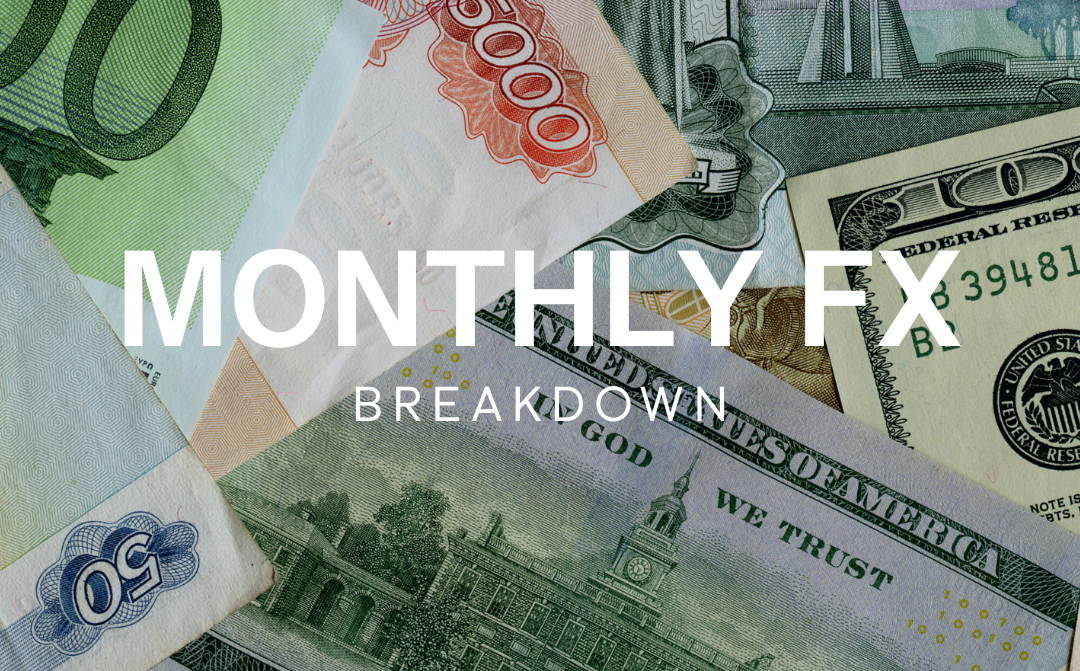Monthly FX Breakdown – 4 Sept

Table of Content
USD
The dollar has spent much of the past month moving higher, with August representing one of the best months in 2023 thus far. That strength has been largely driven by a risk-off sentiment that saw equity markets come under pressure amid growing concerns around the Chinese growth story. With exports down to -14.5% for the year, deflation persisting, record high youth unemployment, credit growth down to the lowest level since 2009, and Evergrande leading a real estate crisis, China clearly faces a huge array of issues that could weaken the global growth outlook. That risk of a market correction does benefit to dollar, and any further weakness in equities would likely provide additional tailwinds for the greenback.
From a US perspective, the rising inflation picture does give some cause for concern at the Federal Reserve, with disinflation coming to a halt. Instead, we are now looking at the economy with rising inflation and elevated core CPI. Comments from Federal Reserve governor Jerome Powell towards the end of the month struck a somewhat indecisive tone, with promises to hike further if necessary counteracted by a promise to remain cautious when considering any additional rate rises. Ultimately, we are in an environment of data dependency, where inflation and wider economic health are going to be key in determining future monetary policy decisions.
The coming month brings a desire to understand underlying inflation pressures and growth prospects. While base effects impact the annual inflation rate, the monthly reading will be key as a gauge of the future trajectory of CPI. The past two months have provided monthly figures of 0.2%, which would represent a pace to take headline CPI down to 2.4%. As such, the ability to look past base effects will be important.
Recent PMI weakness brought concerns around US growth, with higher rates potentially showing signs that have been largely missing thus far. The surge in interest rates and inflation has undoubtedly had an impact on affordability, with many seeing their Covid savings dwindle in the process. Declines across both services and manufacturing PMI readings bring caution over a potential economic squeeze, although this is less of an issue than that seen in Europe. Keep a close eye on inflationary pressures such as energy prices, as any signs of a secondary surge in inflation would likely damage market sentiment in favour of the dollar.
EUR
The euro has enjoyed a relatively strong month, with the elevated nature of eurozone inflation ensuring that we continue to see the currency well supported. Aside from its relationship against the dollar, we have seen the euro perform particularly well compared with the likes of the Antipodean currencies. In part that strength has come amid expectations of further tightening from the ECB, but also a reflection of the greater damage done elsewhere should the Chinese economy weaken further. With CPI struggling to move below the 5% mark, we have seen the pace of disinflation slow. This highlights the problem that the remaining price elements are going to be stickier and harder to overcome.
Unfortunately, the latest eurozone PMI data struck a worrying tone for the eurozone, with sharp declines across the services sector bringing concerns that we may finally be seeing the impact of elevated interest rates filter through. There will be some that consider any such economic squeeze as a positive given the disinflationary effects that likely emerge as a result. However, for the euro, any period of economic weakness will raise questions over the ECB’s willingness to maintain tight monetary policy. As such, watch out for any further warning signs that the eurozone is on the cusp of a recessionary period, with the euro likely to lose traction if that comes to fruition.
Christine Lagarde’s appearance at the Jackson Hole summit saw the ECB Governor maintain a ‘higher for longer’ theme, and that could be tested if eurozone growth and inflation prospects deteriorate. That brings a particular focus on data and ECB commentary over the course of September, with PMI surveys bringing a good leading gauge of economic health that could drive sentiment for the euro.
GBP
The pound has been a significant outperformer over much of 2023, with the elevated nature of UK inflation bringing concerns that the Bank of England will need to employ a higher for longer approach compared with their peers. However, this past month has seen some of the heat taken out of the pound, with inflation easing and the UK showing significant signs of stress. Taking both of those factors together, we have seen market pricing around the next BoE meeting shift away from what was previously a widely anticipated rate hike in September.
The UK economic picture appears to be showing significant signs of stress according to data released in September. In housing, the latest Rightmove house price index fell -1.9% in August, representing the sharpest decline in asking prices since December. The jobs market saw both the unemployment rate (4.2%), and claimant count figures rise (29k). Meanwhile, retail sales hit its worst figure this year (-1.2%). However, the most worrying elements for the BoE will have been the PMI surveys, where both services (48.7) and manufacturing (42.5) fell sharply to signal contractions across the economy in August. Taken together, the UK economy appears to be in trouble.
On the inflation front, headline CPI made significant progress in falling down to 6.8% (from 7.9%). However, concerns remain, with core CPI failing to budge from its 6.9% June reading. Meanwhile, the jobs report showed how wages continue to provide a major roadblock for the BoE, with average earnings up to 8.2%. Much of this wage growth appears to be driven by the services sector, which highlights the potential benefit of a contraction as highlighted by the August PMI survey.
With that in mind, all eyes will be focused on the annual earnings figure in September, with the Bank of England hoping to see wage growth ease back. Inflation remains elevated compared with most developed nations, with any significant decline in CPI and core CPI likely to dampen GBP sentiment given the recent economic data. Meanwhile, with the UK economy having been under pressure over the past month, those same areas of concern covering housing, retail sales, employment, and PMI surveys will be key to driving sentiment around growth, pricing, and monetary policy going forward.
CAD
The Canadian dollar experienced a relatively indecisive August with the currency failing to gain any particular direction on average. Reliance on energy prices for direction coupled with uncertainty around the economic and monetary outlook have stifled any particular directional bias for now. While there are concerns around the impact of a Chinese slowdown could dampen sentiment for the Canadian economy there is also hope that this could help in the fight against inflation. Meanwhile, the positive correlation between CAD and WTI means that the burgeoning Chinese crisis could hurt the Canadian dollar if we see energy weakness on demand concerns.
From an economic perspective, August saw a number of warning signs that the Bank of Canada will undoubtedly take note of. The jobs market has flashed red, with unemployment rise, and the employment change fell into negative territory for only the second time this year. Retail sales meanwhile similarly provided cause for concern with the core reading falling into the deepest monthly contraction in 11 months. Finally, the leading Ivy PMI survey fell further into contraction territory, highlighting the deterioration of business conditions and growth prospects in Canada.
Much like the US neighbours Canada saw inflation turn higher in August, rising from 2.8% to 3.3%. With the economic outlook starting to sour, this coming month will be key in determining whether we are going to see the prospect of a recession grow. Keep a close eye out for those same key metrics of economic health, alongside inflation data which is likely to turn lower in the coming months. Meanwhile, energy prices remain key, with Chinese concerns providing the potential for CAD weakness if we see crude sentiment sour.
AUD
The Australian dollar has been hit hard over the past two months, with concerns over the Chinese economy serving to dampen sentiment around this major exporting nation. August began with a surprise rate freeze from the RBA, and markets expect a cautious approach going forward given the potential contagion effects coming from China.
Declines across both manufacturing and services PMI readings brought both sectors into deeper contraction, with the Australian economy clearly coming under pressure. The jobs market signalled a similar pattern, with unemployment rising and the employment change figure coming in at a 2023 low of -14.6k. With higher rates and fears around China dampening sentiment, there is a risk of further AUD weakness as we move forward.
While the RBA opted to keep rates steady in August, a change at the helm in September sees new Governor Michele Bullock step into the hot seat. This provides some uncertainty going forward, with her first meeting likely to bring volatility for the AUD. Meanwhile, continuous updates from China bring the potential for additional concerns in Australia, with economic data and policy changes from the Asian nation likely to factor into AUD pricing. Closer to home, growth inflation and jobs data will be key, following an early RBA rate decision next Tuesday.
NZD
The New Zealand dollar has similarly suffered over recent months with concerns around China dampening sentiment for the antipodean currencies. With the RBNZ having already lifted interest rates to a lofty 5.5%, there is little chance of further tightening going forward. Data remains key nonetheless, and the latest global dairy auction price figure provides cause for concern given the country’s reliance on agricultural exports. A reading of -7.4% marked the second biggest monthly contraction in seven-years, highlighting how weak Chinese demand is negatively impacting the price of New Zealand’s exports. Unsurprisingly declining export prices are driving a widening in the trade deficit, which fell to a four-month low.
Keep a close eye out for further signs of weakness for the month ahead, with the worsening outlook in China likely to keep NZD under pressure. The RBNZ looks likely to keep rates steady going forward, with the economy seemingly taking a turn for the worse. With that in mind, the New Zealand dollar looks likely to come under pressure unless we see a surprise rate hike, or improvement to the Chinese growth picture.
Disclaimer: This material is a marketing communication and shall not in any case be construed as an investment advice, investment recommendation or presentation of an investment strategy. The marketing communication is prepared without taking into consideration the individual investors personal circumstances, investment experience or current financial situation. Any information contained therein in regardsto past performance or future forecasts does not constitute a reliable indicator of future performance, as circumstances may change over time. Scope Markets shall not accept any responsibility for any losses of investors due to the use and the content of the abovementioned information. Please note that forex trading and trading in other leveraged products involves a significant level of risk and is not suitable for all investors.







